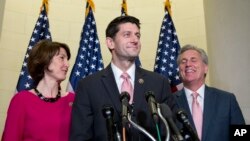Majority Republicans in the U.S. House avoided an internal squabble and picked a new leader Wednesday, and after several years of lurching from one fiscal crisis to the next, the chamber passed a budget that would avert any such showdowns until 2017.
The bipartisan, $80 billion bill would raise the debt ceiling until March 2017 and would increase unpopular, across-the-board spending caps on domestic and military spending for two years.
The 266-167 House vote sent the budget plan to the Senate, which could start work on it as early as Thursday. Time is critical because both chambers of Congress need to raise the U.S. borrowing authority by November 3 to avert a potential default on the national debt.
Adoption of the package also would let Congress sidestep threats from its most conservative members to force a partial government shutdown in protest against continued borrowing.
The budget deal was a crowning achievement for outgoing Republican Speaker John Boehner of Ohio, who had vowed to “clean the barn” before leaving his post and Congress this week. Boehner was a key player in negotiating the budget deal, along with Senate Republican leaders and President Barack Obama.
Most Democrats voted for the budget deal, saying it would eliminate the frequent showdowns of the past several years and provide the U.S. economy with much-needed certainty and stability. A large number of Republicans opposed the agreement, saying it had been negotiated in secret and borrowed from the future to pay for the present. Several Democratic members took the unusual step of thanking Boehner for his role in forging the spending compromise.
After the vote, Democratic House Minority Leader Nancy Pelosi of California and Senate Minority Leader Harry Reid of Nevada praised the budget deal, singling out Obama and Boehner for coming together on a compromise that they said would benefit working Americans.
Ryan nominated
House Republicans met behind closed doors earlier Wednesday and voted to nominate Ways and Means Committee Chairman Paul Ryan of Wisconsin to become Boehner's successor. The full House will vote to elect a new speaker Thursday, and Ryan is expected to win the gavel.
Ryan, 45, who was his party's vice presidential nominee in 2012, thanked his Republican colleagues for the honor of the nomination as speaker, and he pledged to unify the fractured party and give rank-and-file lawmakers a say in shaping legislation.
At a party meeting earlier in the day, one lawmaker quoted Ryan as saying, "I don't plan to be Caesar, calling all the shots around here."
Ryan also thanked Boehner for serving with distinction, but he said that his party had lost its vision and that it would be replaced with a new one.
Ryan said that he would vote for the new spending plan and an increase in the country's borrowing authority, but that the process that shaped the budget deal "stinks," because top lawmakers bypassed lower-ranking legislators.
"What I’ve heard from members over the last two weeks is a desire to wipe the slate clean, put in place a process that builds trust, and start focusing on big ideas," Ryan said in a statement.
He said the budget plan "will go a long way toward relieving the uncertainty hanging over us, and that’s why I intend to support it. It’s time for us to turn the page on the last few years and get to work on a bold agenda that we can take to the American people."
The congressman's nomination for speaker came at a tumultuous time for House Republicans, after Boehner shocked Capitol Hill by resigning last month amid opposition from conservative members of his own party.
The speaker of the House of Representatives is one of the most powerful positions in Washington. The speaker is second in the line of succession to the U.S. presidency, if both the elected president and vice president die or leave office before their terms expire. That succession of power has never happened in the country's 239-year history.
Some material for this story came from AP, AFP and Reuters.




